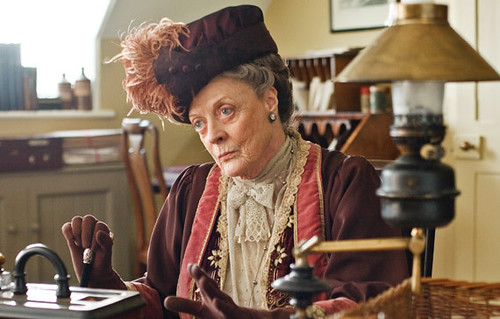 "Don't you care about Downton?"
"Don't you care about Downton?" "What do you think? I've given my life to Downton."
The opening image of a beautifully lit telegraph cuts to that of a train barreling towards the audience. Its whistle interrupts the Morse code, signaling music that complements the engine's chugs. A man stares out the window at sweeping landscape, which is obscured somewhat by steam and telegraph poles. Set in the years preceding the Great War, the prevailing theme in Downton Abbey is change.

We are soon introduced to residents of an Edwardian manor. Servants rush through the early morning, commenting on newly installed electric lights and quipping at lesser servants. Upstairs, family members wake with leisure and descend the staircase with grace.
In the first episode, Robert Crawley, the lord of Downton Abbey and Earl of Grantham, played by Hugh Bonneville, discovers that he must find a new heir. He and his American wife Cora (Elizabeth McGovern) have only three daughters, and his nearest male relative is middle class lawyer Matthew Crawley (Dan Stevens). Even the servants realize that this, as one says, is "more than a shame--it's a complication."

Marvelous acting and a remarkable script bring to life the community of nearly twenty main characters. Bonneville's Robert is the definition of noblesse oblige, old fashioned but benevolent, while McGovern's elegant Cora conveys an American warmth. Michelle Dockery is excellent as Mary, their eldest daughter, who is at turns cruel, charming, and self-deprecating. Laura Carmichael plays Edith, the neglected middle sister, and Jessica Brown-Findlay is the sweet and observant youngest, Sybil.
The most hilariously acerbic lines are spoken by Robert's mother Violet. Maggie Smith plays Violet with enough wit to keep her both obnoxious and endearing. Her rival is Matthew's forward thinking mother Isobel (Penelope Wilton), who is initially less reluctant than her son, snobbish in his own way, to become embroiled in the Earl's family.

Butler Mr. Carson (Jim Carter), a fierce defender of Downton's honor, and wise housekeeper Mrs. Hughes (Phyllis Logan) oversee the staff. New valet John Bates's (Brendan Coyle) limp causes a stir, but competent head maid Anna (Joanne Froggatt) is attracted to his kind demeanor. First footman Thomas (Rob James-Collier) dislikes him and seemingly everyone else except his mentor, the manipulative lady's maid Sarah O'Brien (Siobhan Finneran).
Gwen the maid (Rose Leslie) hopes to leave service, while the frequently flustered kitchen maid Daisy (Sophie McShera) dreams of pleasing the loud-voiced cook Mrs. Patmore (Lesley Nicol), and second footman William (Thomas Howes) pines for home.

Even the most conservative characters are torn between tradition and progress, and the most loathsome have moments of vulnerability and humor. The writing relies on psychological glimpses instead of heavy handed psychoanalysis and is aided by the expressive cast.
Downton Abbey is not politically correct. At times, unsavory characters bitterly espouse equality, and minorities are negative figures. We don't see backbreaking alternatives to service or closeups of the scullery maid's calluses. What Downton's lovely visuals lack in grit, the show compensates for in emotional texture. We witness the effects of bad company and resentment as well as good advice and loyalty.

This world is both familiar and exotic, making it a fascinating study in personality and culture. Its residents adjust to telephones and cars, but most of them have only a faint idea of impending social change and even less knowledge of the devastation at hand. As that cloud hangs on the horizon, characters are caught up in their own lives, and, for the time being, so are we. There is something intoxicating about getting lost in the intrigues of Downton Abbey.
